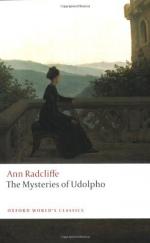|
This section contains 9,493 words (approx. 32 pages at 300 words per page) |

|
SOURCE: “Ideology and ‘The Mysteries of Udolpho,”’ in Criticism, Vol. 21, No. 4, Fall, 1979, pp. 307-30.
In the following essay, Poovey explains the class values system of nineteenth-century English culture and how Udolpho, though it is set in the sixteenth century, actually reflects the class morality of the author's times. Poovey goes on to note that Radcliffe's insights into the coming rise in feminine values are not followed through to their logical conclusion because of the author's faithfulness to the old status quo.
I
The system of “values, ideas and images” which cemented the position of the upper middle class within the social and political hierarchy of eighteenth-century England—and which perpetuated an illusion of power for that class even after the foundations of paternalism began to erode—was based on what eighteenth-century poets and philosophers called the “sentimental virtues.”1 “Sentimentalism,” with its close kin “sensibility,” was the ideology generalized...
|
This section contains 9,493 words (approx. 32 pages at 300 words per page) |

|


